It’s ever so fitting that for a series that seems everything about the noughties anime experience, it just had its Gurren-Lagann moment (15 years ago this spring, if you’re counting). I didn’t know that was going to happen when I wrote the tagline to last week’s post – “I almost feel in watching Sabikui Bisco as if it’s a series I saw in 2007 and am just catching up with again after a long absence” – but it totally fits. This is the sort of show Sabikui Bisco is, right down to its core. TTGL was representative of its time, and so is Sabikui Bisco – TTGL’s time, that is.
 It’s pretty clear from the opening moments of this episode what’s going to happen to Bisco. It’s also clear that the way Milo is baring his soul is not merely a friend expressing his regard for a friend – this is love, which has always seemed one of the options on the table, even if I’m surprised to see it openly acknowledged so early. It’s also sort of ironic, as during this exchange Panda-kun nominally tries to set Bisco up with Pawoo. But the artifice is all but gone between them by this point, and the words Bisco says to Milo after he’s asleep are just as profoundly a confession of love as Milo’s a few moments earlier.
It’s pretty clear from the opening moments of this episode what’s going to happen to Bisco. It’s also clear that the way Milo is baring his soul is not merely a friend expressing his regard for a friend – this is love, which has always seemed one of the options on the table, even if I’m surprised to see it openly acknowledged so early. It’s also sort of ironic, as during this exchange Panda-kun nominally tries to set Bisco up with Pawoo. But the artifice is all but gone between them by this point, and the words Bisco says to Milo after he’s asleep are just as profoundly a confession of love as Milo’s a few moments earlier.
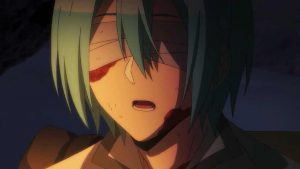 At this point we’re treated to another brutal and very Hollywood exchange with Kurokawa – last week Milo, this time Bisco. I’ve come to think of Tsuda Kenjirou as the Jack Nicholson of seiyuu – an “apotheosis” actor rather than a chameleon. He’s always playing some variant of his instantly recognizable and well-established persona, and Kurokawa is an extreme example. This performance reminds me a lot of Nicholson’s as The Joker in Batman – unforgettable and as camp as a Christmas pantomime. Some loved Jack’s performance and some hated it but it was certainly memorable either way, and so it is with Tsuda-san here.
At this point we’re treated to another brutal and very Hollywood exchange with Kurokawa – last week Milo, this time Bisco. I’ve come to think of Tsuda Kenjirou as the Jack Nicholson of seiyuu – an “apotheosis” actor rather than a chameleon. He’s always playing some variant of his instantly recognizable and well-established persona, and Kurokawa is an extreme example. This performance reminds me a lot of Nicholson’s as The Joker in Batman – unforgettable and as camp as a Christmas pantomime. Some loved Jack’s performance and some hated it but it was certainly memorable either way, and so it is with Tsuda-san here.
 “Little bird, if you don’t sing, I will make you sing” is the Hideyoshi quote Kurokawa alludes to here (part of an apocryphal triptych attributed to Nobunaga, Hideyoshi, and Tokugawa Ieyasu). And the point as regards Jabi is rather plain, as is the fact that Jabi will never break. Kurokawa may or not be the big bad, as I noted last week, but he’s certainly bad. He’s using one of the original tetsujin that kicked Japan back to the dark ages to manufacture rust weapons to keep the people dying and raise demand for treatments (again, the big pharma symbolism is unmissable, intentional or not). It’s Pawoo who arrives in the nick of time to save Jabi, but Bisco who arrives with the intent of finishing the job with Kurokawa.
“Little bird, if you don’t sing, I will make you sing” is the Hideyoshi quote Kurokawa alludes to here (part of an apocryphal triptych attributed to Nobunaga, Hideyoshi, and Tokugawa Ieyasu). And the point as regards Jabi is rather plain, as is the fact that Jabi will never break. Kurokawa may or not be the big bad, as I noted last week, but he’s certainly bad. He’s using one of the original tetsujin that kicked Japan back to the dark ages to manufacture rust weapons to keep the people dying and raise demand for treatments (again, the big pharma symbolism is unmissable, intentional or not). It’s Pawoo who arrives in the nick of time to save Jabi, but Bisco who arrives with the intent of finishing the job with Kurokawa.
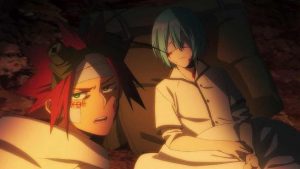 Bisco is literally falling apart at this stage, which is apparently what late-stage rust (pointedly untreated) does to you. This whole showdown is indeed extremely Hollywood – especially noughties or even 90’s Hollywood, fittingly. It has a little of everything – a dagger through the foot, fingers and arms shattering, biting, and a descent into the rust that’s not coincidentally reminiscent of the lava at the end Terminator 2 (though it’s actually a quote from the original Terminator that Bisco throws in Kurokawa’s face) – and the arrow is a callback to the thumb at the end of that same scene.
Bisco is literally falling apart at this stage, which is apparently what late-stage rust (pointedly untreated) does to you. This whole showdown is indeed extremely Hollywood – especially noughties or even 90’s Hollywood, fittingly. It has a little of everything – a dagger through the foot, fingers and arms shattering, biting, and a descent into the rust that’s not coincidentally reminiscent of the lava at the end Terminator 2 (though it’s actually a quote from the original Terminator that Bisco throws in Kurokawa’s face) – and the arrow is a callback to the thumb at the end of that same scene.
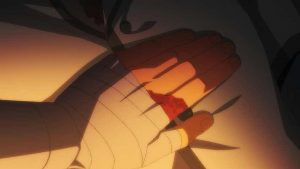 This whole scene is ballsy, campy, and violent in a very old-school and fearless way. Most of the big set pieces in Sabikui Bisco are, and it’s highly effective. Milo confessing his love in this environment seems incongruous, but it somehow works – the last conversation between he and Bisco manages to be really tender amidst the usual Sabikui Bisco insanity. I suppose some viewers who might be part of the core audience for this series might be turned off by that, but it too feels pretty authentic to 2000’s anime and honestly – who cares?
This whole scene is ballsy, campy, and violent in a very old-school and fearless way. Most of the big set pieces in Sabikui Bisco are, and it’s highly effective. Milo confessing his love in this environment seems incongruous, but it somehow works – the last conversation between he and Bisco manages to be really tender amidst the usual Sabikui Bisco insanity. I suppose some viewers who might be part of the core audience for this series might be turned off by that, but it too feels pretty authentic to 2000’s anime and honestly – who cares?
 I certainly don’t think we can discount the possibility that Bisco will somehow survive this – and if he does Kurokawa presumably would too – though they could follow the false main character route and play this through. I don’t know how it would happen – my money would be on their both being mushroom keepers being part of the answer – but it’s not going to hugely surprise me if it does. At the very least it looks like we’re going to get a spell of Sabikui Bisco without the Bisco, and it’ll be interesting to see if the series can keep operating on this rather high level without him.
I certainly don’t think we can discount the possibility that Bisco will somehow survive this – and if he does Kurokawa presumably would too – though they could follow the false main character route and play this through. I don’t know how it would happen – my money would be on their both being mushroom keepers being part of the answer – but it’s not going to hugely surprise me if it does. At the very least it looks like we’re going to get a spell of Sabikui Bisco without the Bisco, and it’ll be interesting to see if the series can keep operating on this rather high level without him.


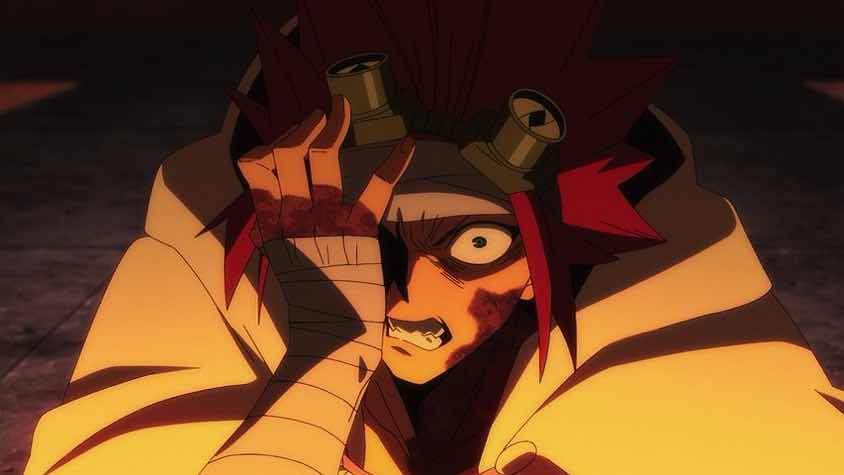
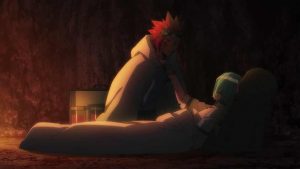
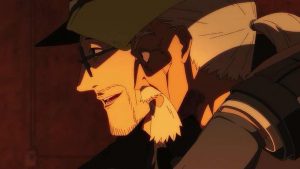
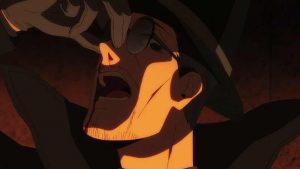

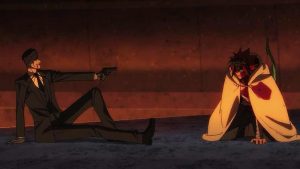


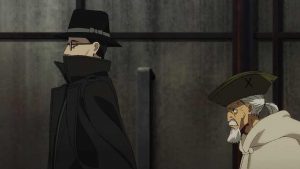
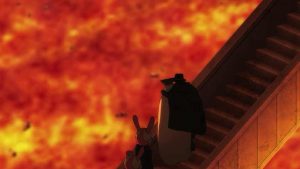

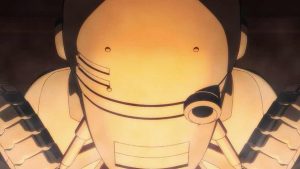
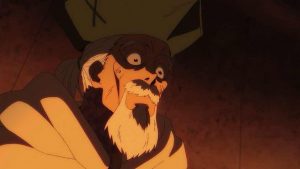
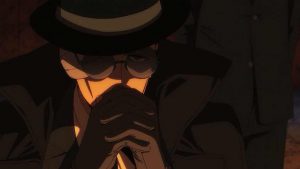

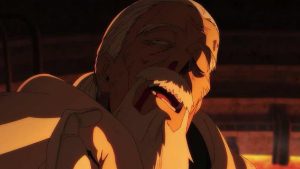
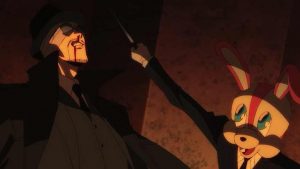
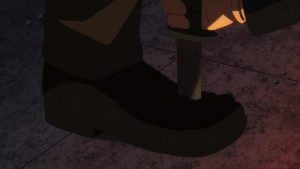


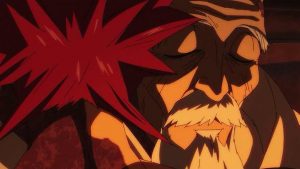
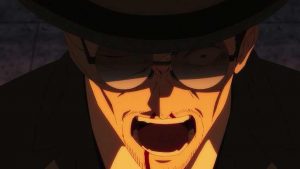

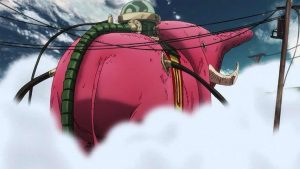
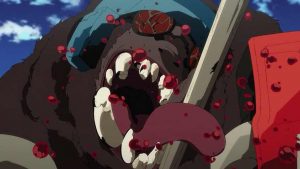

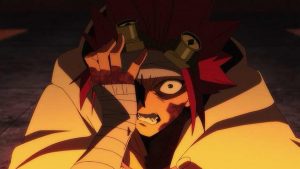
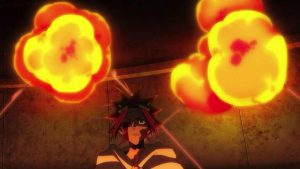
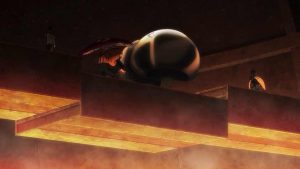
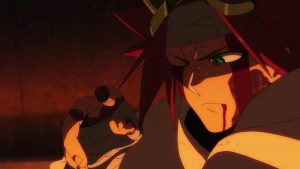

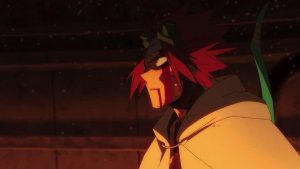
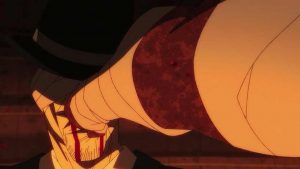
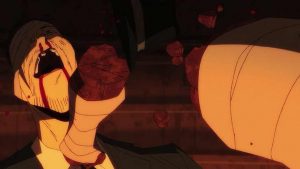
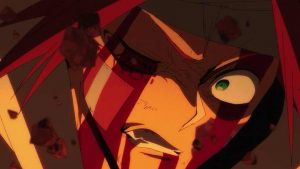
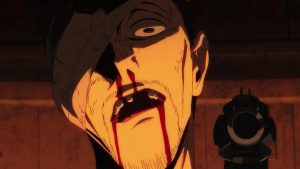
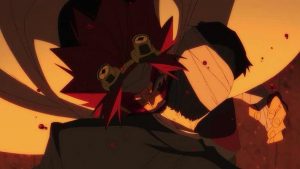


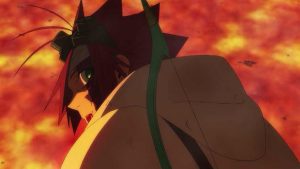

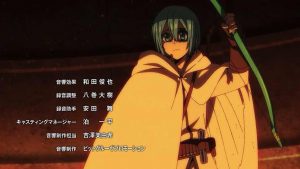


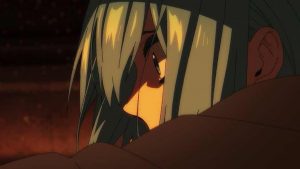

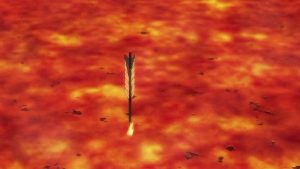
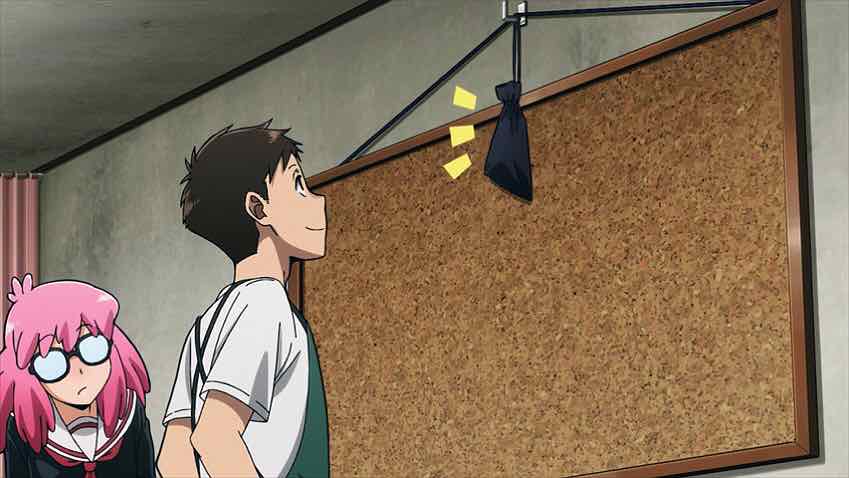
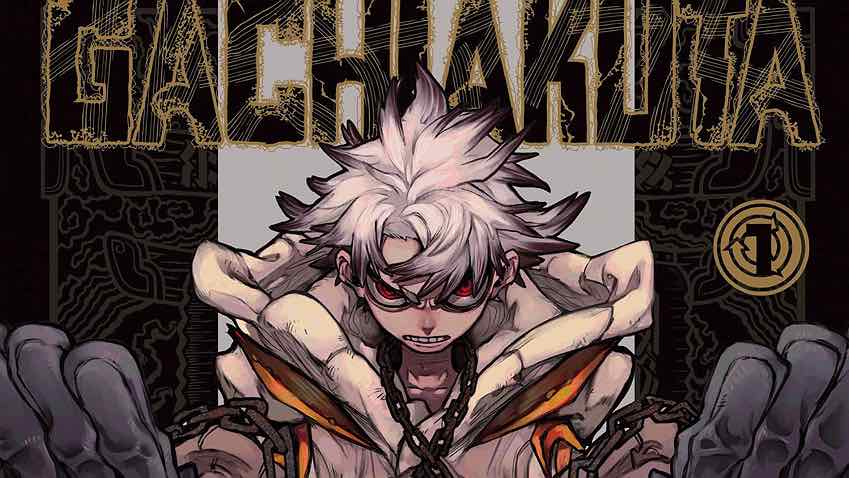
Collectr
March 9, 2022 at 6:22 amTTGL, indeed. But even Kamina didn’t ask Youko or Simon to help with what was, in effect, assisted suicide. This episode has amped the drama to 11, and the fat lady hasn’t sung yet. (The series feels almost operatic to me.)
My biggest concern is that there are only three episodes left. Can the creators reach a reasonable stopping point, either resurrecting Bisco, or having Milo become the new Bisco, in so little time? Perhaps the series is so popular in Japan that a second season is a ‘lock’?
Guardian Enzo
March 9, 2022 at 7:56 amI see no evidence that’s the case. Anything’s possible but I expect one and done.
animealex
March 10, 2022 at 4:00 amI’m kinda conflicted with my views on this show now. On one hand, I like the crazy and wild atmosphere of this show. A cannon formed like an elephant? Fantastic, engineered monsters out of nowhere to the rescue of the bad guy? (Guillotine Gorilla anybody?) Terminator allusions during the climatic battle? Sure, why not. I like it. But, as I said two weeks ago, there’s also a kind of stupidity with the main characters going on. This week, it was clear, that Bisco was doomed due to the strong and untreated Rust Infection, so he goes out in blazing glory against Kurokawa. Fair enough. (And it’s satisfying seeing the bad guy having a breakdown due to his inability to kill Bisco.) But there were multiple chances last episode to end Kurokawa once and for all, which in turn would’ve avoided this dramatic turn of events. My point: If you want such a dramatic showdown, don’t make the mains behave suddenly stupid to produce the chain of events necessary to get there.
Regarding the love confessions: To my surprise, I saw most people chalk it up to them as being really good friends and nothing more. I mean, I don’t speak Japanese, but even I know how significant at least the verb used here to express “love” was. Oh well, let’s see how this plays out, if Bisco somehow comes back.
Guardian Enzo
March 10, 2022 at 7:50 amDenial is not just a river in Africa.